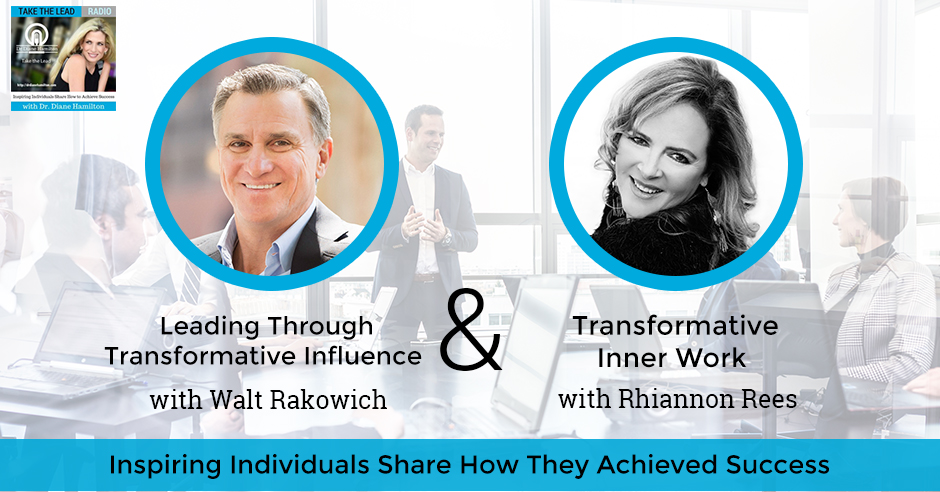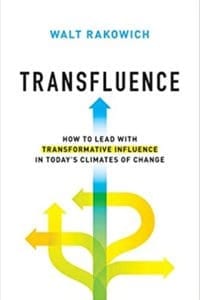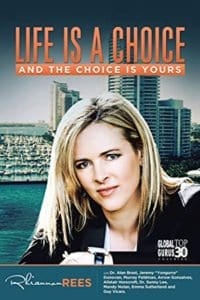In this era of change, leadership has to move away from its association with authoritarianism and into a new paradigm of transformative influence. This is what Walt Rakowich learned from his personal experience of becoming that leader when times are tough. When he became an executive at Prologis in 2008, the global real estate company was on the verge of collapse. Quickly implementing a drastic change in culture Walt orchestrated a dramatic turnaround that brought the company back to its position in the industry. He is the author of the newly-released book, Transfluence, where he outlines the principles of leadership through transformative influence. Listen as he talks about some of these principles with Dr. Diane Hamilton.
Discomfort can be the greatest motivator of all. Ten years ago, Rhiannon Rees lost everything – her marriage, her business, her house and her mind. Refusing to let the lowest point of her life define her, she did the best she could to get out of that place. Now, she is a bestselling author and a number one business and performance coach at the Conscious Coaching Collective. What sorcery caused her to undergo such a radical transformation that allowed her to become a leader in her niche? Sitting down with Dr. Diane Hamilton in this episode, she explains some of the conscious inner work that helps people break free from their limiting beliefs, rise up from their lowest points and steer their lives into radical transformation. If you think you’re in a place where you cannot move forward anymore, it might be time to ask yourself if you are being the greatest obstacle to yourself.

I’m glad you joined us because we have Walt Rakowich and Rhiannon Rees here. Walt is the former CEO of Prologis and he’s got a new book called Transfluence. Rhiannon is a human behavioral expert. She’s the bestselling author and a global guru. We are going to talk about a lot of things leadership.
Watch the episode here:
Listen to the podcast here
Leading Through Transformative Influence With Walt Rakowich
I am here with Walt Rakowich who is a leadership speaker and former executive of Prologis, a global real estate company that was near collapse when he took over as CEO in 2008. During the economic turndown, Prologis stock dropped from $70 per share to approximately $2 per share in ten months making it the third worst-performing company in the S&P 500. After Walt joined as CEO, he quickly implemented a change in culture through transparency, orchestrating a dramatic turnaround and restoring its position in the industry. Walt is the author of Transfluence: How to Lead with Transformative Influence in Today’s Climates of Change. I am excited to have you here, Walt.
It’s great to be here, Diane. Thank you.
This is going to be fun. I’m interested as to how you turn things around because I talked to many companies about how to do that through developing curiosity. I’ve worked in real estate, lending, and a lot of the stuff that you probably were dealing with is something I had to deal with at one point or another. Give me a little background on you. I gave some of it but what led to you even joining Prologis and getting to that point?
As regards to leadership period which is what the book is about, our world over time has been shaped through leadership, unfortunately, both bad and good. Throughout my life, I’ve tried to become a student of it and learn as much as I can become a better leader myself. The story of Prologis is interesting in that I had been with the company for roughly 14 or 15 years moving up in the ranks of the company and ultimately became the number two position president-chief operating officer.
This was around the pre-financial crisis around 2006, 2007. After rising through the ranks, I worked directly for the CEO of the company who frankly was one of the most brilliant people that I knew. He believed that he was always right. When you believe you’re always right, that leads to a lack of delegation and lots of other things. He paid little attention to what others had to say. Somewhat dictatorial in his style. It led to a siloed culture in the company, and a lack of discipline on some of the things that we did.
I saw how it was changing the culture. I talked to the board after that. I said, “I can’t be around at this point in time. I think the company’s headed for a farewell.” Little did I know that the whole market in 2008 would probably be down 40%, but this was in 2007. At that point, I left the company. Our stock was at an all-time high, which is a little over $70 a share. Over the course of the next ten months, it was amazing. By March, it’s down to $60, by June it’s down to $50 and by the time it’s September, it’s down to $10 a share, $5 a share.
The board called me up in November 2008 and they said, “Walt, the stock is falling over 95%, we need you to come back and turn around the company.” I knew it would take a herculean effort. My first reaction was, “No, I don’t want to do it.” I thought about all the people that I had hired over the years. I couldn’t allow that to happen. I couldn’t let the company go. I think crucible moments are sometimes our best opportunities to lead. While we wouldn’t wish them on anybody, I was fortunate in that looking backward, I had that opportunity. I probably learned the most about leadership during that opportunity and that’s when this whole notion of Transfluence became alive and well to me.
That’s an interesting outlook of how things turned around. I remember I was working at Equifirst before the collapse which was a subprime lender, and then I got into real estate with Keller Williams and some other different things before I went back into more education-based training and things that I do now. I remember how challenging those times were. As you were talking about your leader believing that he was always right which led to many different things. I talk a lot about curiosity and I’m interested in how to get people out of status-quo thinking. It sounds like that guy when you think you’re always right, you lack that ability to delegate, and then don’t you end up in status-quo behaviors? Do you talk about that? Do you write about that? Tell me what do you mean transfluence.

Transfluence stands for transformational influence. I think that as a leader, you’ve got a lot of objectives. My objective was to turn to around the company or sometimes their financial objectives. I think your most important objective is the influence that you have on those you lead. I think it starts with an understanding that it’s not about you. It’s about influencing others to accomplish great things and making them better at what they do. If you do that, you will all ultimately accomplish the goal that you’re looking to accomplish. People ask me all the time about the word transfluence like,
“Is that in the dictionary?”
Transfluent is in the dictionary and it means something like water flowing through a spring that would blow past you. We say in the book that transfluence is similar because it needs to flow from the heart of a leader. I think leadership is not just about this notion of it not being about you, but it’s about building trust in an organization. If you can build trust in an organization, you have something and if you don’t build trust, you’ve got nothing.
You bring up something interesting because I was talking on a panel and the people I work with on this panel, and I have worked on several boards with Keith Krach who was a former chairman of DocuSign. We talk a lot about how people who know Keith would do anything for him. He’s one of those leaders who shows a sense of vulnerability. He won’t pretend like he knows everything and he hires people who do know that some of the things maybe he doesn’t know and he’s the first to tell you. He’s humble. People trust him. I noticed that you were talking and writing about how vulnerability is required now more than ever. Why do you think now more than ever?
It’s because it’s human. It’s powerful and it’s difficult for a leader to do. Leaders are supposed to have all the answers. That’s why they’re hired. When I was brought back as CEO, I was scared to death. I didn’t want to show that I had that fear at first. I think showing that fear was important. I will tell you a quick story. I was sitting there in a meeting at about 1:00 in the morning. We’re working-dog years back in the day to turn the company around.
I have a finance person and a bunch of finance people in the meeting. One person said to me, “Unfortunately, we’re going to blow our covenants on $6 billion in bonds.” I said, “When is that?” He said, “Probably next quarter.” I turned white as a ghost and I looked around to everybody in the room and I said, “Do you guys mind if I walk out of here and catch my breath?” They said, “Walter, that’s fine.” I walked down the hallway and I’m starting to faint.
I look at this chair in the distance and I ran towards the chair as fast as I could and I couldn’t get there. I fainted. I hit my head on the side of the desk, split my head open. I’m lying there in a pool of blood for ten minutes and then I woke up and I realized, “All these people are still in this room while my head’s cut.” I went into the bathroom and quickly tried to get it to stop bleeding, walked back in the room and I said, “Let’s talk about this bankruptcy thing.”
My CFO looked at me and he said, “Let’s talk about that egg on your head right now.” I was completely busted. What’s interesting is sometimes you’re completely exposed and you have nothing to say. I looked at everybody in the room and I said, “I’m going to tell you this. I don’t have the answers. You told me we’re going bankrupt. I have no idea how to solve this problem.” The powerful thing about it is it’s empowering. Everybody in the room looked around.
There was silence for about ten seconds that seemed like it was eternity and then somebody looks up and says, “Don’t worry Walt, we got your back and we’re going to get through this.” It was powerful. The vulnerability can be powerfully used. I’m not saying that a leader should always do it, but you shouldn’t fear doing it at the appropriate time because people love that transparency. They love that openness because they’re going through the same things themselves.
[bctt tweet=”Leadership is not about you. It’s about influencing others to accomplish greater things.” via=”no”]It’s like self-deprecating humor. There’s a point where the people go, “You’re human. You’ve made mistakes.” Back to the Keith Krach example, I remember when he was on the show, he told his wife that there’s going to be nights that he’s going to be in a fetal position under his desk as a CEO when he took over. He goes, “That’s what happens.” I think that that’s something that comes up a lot is how leaders are afraid that people are going to figure out they don’t know everything they’re supposed to know.
We have a lot of leaders who are trying to figure out how to innovate, how we’re going to get past this crisis and it’s a tough time. I think a lot of them when I talk to them when I talk about curiosity and getting out of status-quo thinking, we look at fear and fear is not just for employees, it’s for leaders as well. How did you instill that sense that not to fear this? They were helping you not fear in some respects as well. How do you get people over the fear of being curious about asking questions, moving forward, and moving on?
I think one thing that was helpful to me was coaching. I’m a big believer in personal boards of directors’ accountability groups and coaches. Harvard Business Review did an article about this years ago. It was one of the most intriguing articles I’ve ever read. It was called What CEOs Are Afraid Of. CEOs are a metaphor for leaders. What are they afraid of? They asked them, “What are your biggest fears?” There are over a hundred C-Suite executives and you know what they found the number one fear was? You might think it’s the competition, the people, financial wellbeing, whatever it is. The number one fear was incompetence. C level people were worried about being wrong and not having the right answers.
The number two was underachievement, basically not doing enough, or your competitors doing more. The number three was appearing too vulnerable. The interesting thing about all of those fears is that they’re about the leaders themselves and not the companies or the other people that they’re leading. I think that is a bad recipe for leadership. When you start looking inward towards yourself, you cannot lead, you can’t influence other people and I think that coaching, personal boards of directors, directors, accountability, whatever it is, you can find somebody on the outside that can look at you.
Perhaps it’s looking at your 360-degree evaluations if your company does those, or it’s doing a personality test. At the end of the day, we need to learn about ourselves. We need to find out what makes us tick and we need to try to do our best to check that box and move on. I found that it was incredibly important to me to have a coach who unfortunately told me bad news, as well as good news. I’ve found out a lot about myself and I found out a lot about how I could improve.
A lot of it is delivering how that’s delivered. I love that you brought up this personal board of directors. When I was an MBA program chair at the Forbes School of Business, I had my own little board for my division. Marty Zwilling who’s been on my show, who’s influential Forbes writer was one of the people I had in my group and all of us did this. We eventually had these little boards to help us with our individual groups. It’s not an overall board which they had that for the company. Is that what you’re talking about? You had your own individual board of directors in addition to the regular one for the company?
The corporate board of directors that I had, I’m not sure if I would have felt comfortable sharing a lot of personal things with them. It’s nice to have somebody that’s unconnected with the organization. One of the things that the coach told me and I thought I was a good people person. He does all the personality testing, etc. He comes back and says, “Let me tell you the good news. The good news is that people like working for you. The bad news is that your empathy scores aren’t that high.” I was like, “Are you kidding me?” He said, “They don’t feel like they can approach you because you’re always running around like a chicken with your head cut off.” That was like a dagger that went into my heart. Those are the things that I would have never recognized that about myself. You need somebody to tell you that.
You don’t start off with, “Let me tell you what your problem is. Here’s what’s wrong with you.” It’s interesting because in my research in curiosity, I’ve had Francesca Gino on the show and she has a great piece on HBR. That was the case for curiosity and in a lot of her research showed that leaders all thought that they encouraged curiosity when in fact, and a good majority did when a lot of their people didn’t feel like it was encouraged.

That perception of what we think we are versus how others perceive us is important. When you look at perception, it’s a combination to me of IQ, EQ, and CQ for cultural cushion, but also CQ for curiosity quotient combined. When Daniel Goleman was on the show, we talked about these personality tests and sees the big EQ guru. He felt that 360 evaluations were helpful in emotional intelligence. I think that the personal board of directors is something I have never seen anybody talk or heard anybody talk about on the show.
Other than I know I’ve done that, and you’ve done it, I’m sure a lot of people had done it. I wish I’d talked to more people about this because I think that that’s a critical thing because I see a lot of board of directors where they say they’re diverse and there are a lot of them are slanted to financial executives and, and men who have had C-Suite positions. I think when you get a personal board, you can get more of the cultural experts, more women, and more diversity.
I think it’s important. I think that in some respects, the least connected they are with the organization the better. You don’t want to have somebody that’s too close, but you do want to have somebody that you can share a story with and say, “How would you handle this? Do you see certain things in me that I could do better? Am I’m going to give the speech? What do you think about the speech?” Some people go to the length of hiring their own personal coach. That’s a financial decision, but there are people that do that. I did not hire a personal coach because our company hired one for me. I think it’s money well spent.
Did you pay for your board of directors or was that a volunteer position?
I never shelled out money for that. They were good friends.
It’s nice that you had that and I’m curious how many you had and what were their specialty areas were?
I had five or so that plugged in and out of my life over time. I would say that there’s a complete bias towards business executives because I wanted people to understand and to know the things that I was going through on a daily basis. Sometimes it’s hard to have that person that is not doing business in other areas that can plugin. A few of them were in real estate because you want somebody that specifically understands your industry. Interestingly enough, I do a lot of personal boards of directors for friends or younger people. I take pride in doing it. I think it’s helpful for them but it’s also helpful for me to stay connected in the world.
I think any mentorship is helpful. In the research I did for curiosity, what was interesting to me were the companies that came up with these ideas that they did that made such an impact thought outside not just to their cubicle, their silo or even their company. They thought outside their industry. They would go to completely different industries and go, “How are they doing this?” I think we get siloed. We get stuck in our own industry and I think that now we’re trying to innovate and do all these things to get past COVID and all the things that are going on. How did you build your ability to think outside of the traditional way and going back to the empathy thing which is a huge part of emotional intelligence? It fascinates me because I’ve done a lot of research in that area. How did you learn to build your empathy and did curiosity play a part?
[bctt tweet=”The best leaders are humble, brutally honest and unapologetically human.” via=”no”]I had an unbelievable conversation two months into the job when I back as CEO with a gentleman by the name of John Mack, who was the CEO of Morgan Stanley. I wouldn’t say that John became a personal mentor of mine because it wasn’t like I called him all the time. He spent some time with me because in 2008 with Goldman Sachs and Morgan Stanley and everybody else is going through. I said to him, “John, how you’d to handle this?”
He said, “Over the years, I’ve learned that I manage the company on the basis of the three ages.” I said, “What’s that?” He said, “The best leaders are humble. The best leaders are brutally honest and the best leaders in the market have a sense of humor.” Bankers need to have a sense of humor. I thought about that and it’s funny. I laughed. I started thinking as to what does that mean. I started thinking about it but I’m not the funniest guy in the world. What he meant is humanness.
If you’re going to crack a joke from time to time, what you’re trying to do is connect with people. Have a heart and be human. In my book, I talk a lot about the value of humility. I talked a lot about the value of what brutal honesty means in the workplace. I talk about the value of being human and having a heart means servant leadership. Putting other people before you. Empowering them. Listening to them, encouraging them, and lifting them up.
You were talking about the COVID environment and that’s what leaders need to be. You’re on these calls with dogs barking in the background, baby’s crying and early Zoom calls, and door doorbell’s ringing. Then you’re working at 8:00 at night at 6:00 in the morning. It’s not an 8:00 to 5:00 job anymore. The big thing is that it is a melding of your personal life and your business life like no other. If you’re a leader that can’t manage with the heart if you don’t have empathy and flexibility in this environment, you never will and you’ll never be a great leader.
I think leaders need to be asking and listening maybe before they’re acting. I think they shouldn’t necessarily expect people to come to them. They should be meeting people where they are. They need to be managing with an encouraging, uplifting, perhaps inspiring, giving credit, and recognizing people like they never ever did. They have to understand that people are struggling in this environment. There are people that have mental health issues from this environment to the extent that you as an employer have the financial means to do it.
I’m on one board of a company where they’re asking employees and offering them mental health counseling to the extent that they need it not as a perk, but as how do we keep our employee base sane. I think that’s the way we should be managing and thinking about this environment as managers. What John Mack told me many years ago in terms of humility, honesty, and having a heart, I think is important and even more important in this environment.
There’s much great information in what you shared there because I still teach for a few universities and I put a lot of these clips in my classes because I’m thinking of a class where focuses on Greenleaf Center for Servant Leadership and you flip that pyramid upside down. You’ve got the leader at the bottom instead of at the top. There were the leaders there for support that is to be at the top of this thing. It’s an interesting thing for people to consider as they lead. There are many things that hold people back.
In the research, I found that not only fear holds people back with the voice in their heads, but the things they tell themselves, technology, the over and underutilization of it, and their environment. Anybody, they’ve ever come into contact with. We’re having a different contact with people. For me, I’ve always worked virtually and I’m loving it but for people who’ve never worked virtually, they’re completely stressed. I’ve seen other companies where they’re doing the same thing. They’re investing in the medical, and they’re doing virtual happy hours and book clubs, and trying to socialize these people in a way to try and get that human connection.

In my book, I interviewed Frank Blake who was a previous CEO of Home Depot and a terrific guy. I didn’t realize, but Home Depot also had an inverted pyramid with the CEO at the bottom. It’s interesting because he says, “When the CEO’s at the bottom and everything emanates out from that if you don’t have a high degree of integrity, everything fractures above you.” Also, from an informational flow, it’s a lot of work for a leader. It’s got to flow upward as opposed to flowing downward. He had some interesting comments about what you said.
I’m going to make sure my students check this out because I think that you’re onto some of the critical issues of what we’re facing now, not just in COVID, but in general, as we’ve got many generations in the workplace that we haven’t had before. We’ve got changing innovations going to replacing jobs and all of this lack of engagement that we see. Gallup’s saying we’re losing $500 billion a year in all of this. If we could work on all these things, it’s a huge plus. This is an interesting conversation. I was glad that you were going to be on the show. I know that people are going to want to follow you. How can they reach you and follow you and get your book Transfluence?
My website is WaltRakowich.com. I’m on Twitter @WaltRakowich and LinkedIn, Walt Rakowich. I think the quickest way to get the book will be through either Amazon or Barnes & Noble. Hopefully, over time, it will trickle into some of the major retailers in your neighborhoods. That’d be the quickest way either digitally or through hard copy.
I’m excited for you. Thank you for being on the show.
Thank you, Diane. It’s great to be on your show.
It was fun. I learned a lot.
Transformative Inner Work With Rhiannon Rees
I am here with Rhiannon Rees who is a human behavior expert, international high-performance coach, and self-development expert. She’s an Australian native. She has decades of professional experience as a bestselling author, thriving entrepreneur, and global speaker. You might have seen her work. She has some of the bestselling books out there. She’s also ranked number six of global gurus ahead of well-known experts, Tony Robbins, and Jack Canfield. It’s exciting to have you on the show, Rhiannon.
Thank you so much for having me. I am excited to join you here.
This is going to be interesting. I know you’re the Founder of Conscious Coaching Collective and you have all these accredits behind your name and all the stuff you’ve done. Maybe if you could give me a little background on you and how you got to get to this level of success. It’s always nice to have the backstory a little bit.
It’s interesting how you draw life to you and how life unfolds for you. When I was younger, I would never have imagined my life to unfold in this way. I think that most of my success has come through hardship and a lot of successful people, it’s the time that they fell over that I’ve created the success for them and not for everyone, but for most people, that’s where you do all your learning. That’s where all your growth happens. Years ago, I lost everything. I lost my marriage. I lost my business. I lost my house and I lost my mind.
It was in a short space of time. Once you start to lose your balance mentally, then you stop making good decisions. You start to unravel and you start to make decisions that are not your best choice. They seem to be the best choice at the moment. Often when we’re in those times of hardship or struggle, we’re busy trying to put the pieces of the puzzle back together that we don’t take time out to think strategically like, “Is this going to be a good path? I wonder if I should speak to someone. Should I get some help?”
What you’re doing is you’re going round and round on the wheel going, “I’m going to do this. I’m going to do that. I’ll make it work.” You’re unraveling and making them worse and worse decisions. You’re going further down the pipeline. At my lowest point, in that particular part of my life, after three years of sitting in the over 40 houses with my then four years old son. From 1 to 4, he was homeless. I was sick of trying to find these houses that I decided if could borrow a tent then I could put it up and take it down and have control over, “I got a house. It might be a tent but here’s my roof.” Things are getting worst.
It was like Will Smith in The Pursuit of Happiness. I was waking up early in the morning, going to clean a restaurant and then drop my son to daycare, go to work, pick him up, do my clients, and then go back to the tent. At that stage, there was nothing left inside. I’m like, “How is someone who’s been to university ended up here? This is ridiculous.” It was a series of poor decisions and thinking that it was going to be a short time and I was sorted and all of those things.

At the time I used to pray to God like, “God, can you please change this? This is not fun.” What I didn’t realize is that God had already given me the strength inside to do that. I wasn’t making the choices to change it and then I got a call from my mom that she was ill and I’m 1 of 8 children. I thought, “If anything happens to my mom, I’ll never forgive myself for not being able to fix my situation to go and help her.”
That was a defining moment. Within about four days, I had the money. I had points from friends because I called everyone and I got on a plane and I came back to Australia. I helped my mom and that was a turning point for me because even though she was living in the housing commission and we were sharing a one-bedroom unit, the three of us, I felt like I was living in the Taj Mahal. I was still trying to run my business remote and when my mom got better, the universe shines a light on me.
It’s like, “What are you going to do now?” When you’ve had a situation that is hard but has tested the fabric of your soul, then that’s the last thing you want to do again. My mind is like, “How can I get as far away from this as possible? How about let’s become the number one coach in the world?” What I want to do is be the best that I could be in the field that I was in, because then I’d be far away from that tent. That’s what I did.
Within ten years, I became the number one business performance coach, and the number one global visionary. The motivating experience was the absolute discomfort and uncertainty for those three years were horrible that it was such a driver to never live like that again. If my life hadn’t had those three years and I had cruised along and had a normal life, there’s no way I would have been here because it was the motivator and the driver, who needs to be at the top? I don’t want to be at the bottom was more of the driver.
You said you went to university, you hit this peak of performance. What made you qualified to be a performance coach at that point?
Because of all the hardship I tackle, that’s just one of many. It created a deep fascination and curiosity in my soul about why do we do the things that we do. Not only have I spent years studying. I did a three years Master’s in case taking, understanding how people present, and from there, I’ve had an absolute fascination for what makes people tick. When I work with people in business, in Olympic sports or celebrities, I’m looking for a fine thread that weaves its way through all of the narratives of all of the story that tells me fundamentally, what is the place that they move from? Sometimes the place is, “I have a victim mindset.” “I’ll always live in poverty.” “I could never be that.” “I’ll never be famous.” “I’ll never be successful.”
What I’m looking for is to find a key to unlock the first self-limiting belief that then catapults some success, which creates the first run on the board for my clients. Once they experienced that run, because they’ve now transformed that self-limiting belief, then they’re like, “I could actually feel the water with an ax.” It’s because they’re starting to harness their inner talent, inner knowing, inner wisdom. The real journey that they’re meant to live on this planet starts to unfold and they start to live from a congruent place. I love being the detective and going, “What is it that’s holding you back? Where is that self-limiting belief and how are you creating substandard results?” You allow them and you indulge in them because this is where your comfort zone lies. It requires a lot of experience, a lot of work, and a lot of training.

You’ve done some work with some famous people including the Spice Girls, X-Files, NRL, Grey’s Anatomy, Private Practice cast members. How did you get into that group?
I worked with a TV producer. They’re all different leads. Working with the NRL is a funny story. My friend saw an ad for a coach online and he said, “They’re looking for a coach.” I’m like, “I hate football.” He goes, “You should apply.” I sent my resume and from the time I pressed send on my resume within fifteen minutes, someone from that team had called me and said, “Can you get on a plane?” I ended up working. They had 400 people apply for that job and I ended up getting the job, but I was the only non-Olympic medalist in the row.
Everyone else was like a triple gold medal, Olympic extraordinary sports person. When all the team was standing in front of me, they’re like, “What can you teach us? What medal did you win?” I said, “I didn’t win any medals. Give me five minutes.” I only had to tell them my story and then start to go into the mindset of how do you play on the field? What mindset do you have on the field? are you a champion when you play? Do you play every game as if it’s the Super Bowl or the grand final and they’re like, “We train hard?”
I was like, “Can you taste blood on your throat? Do you feel sick at training?” They’re like, “No.” I ended up with a few private clients and other celebrities. I worked with a TV producer and they passed on my name. It was times that I drew to myself and opportunities that I drew to myself I went down that track. The best one is I worked with Gillian Anderson for a quite a while and she’s amazing. She’s an extraordinary individual. She moves from a place of absolute authenticity.
She’s inspirational and you’ve got some amazing names of people whom you’re connected with. I’m wondering if those experiences led to your book writing or you wrote the books and a couple of them, How to Climb Mount Everest in Sandals: The Courage to Live an Ordinary Life and Life Is a Choice and the Choice Is Yours. I’m curious if you had some of those experiences you shared in those books. How did the first one become a best seller?
I always had that first book because I haven’t had a lot of tragedies. I think I’m the type of soul that came to earth and said, “Give me everything you’ve got and I’ll be good with it,” which is like the dumbest thing you can say. I’ve had that loss which I’ve had a lot of experiences as most people would never experience what I’ve experienced in one lifetime. I decided I should write that first book, which is a bit like Will Smith The Pursuit of Happiness and I never wrote it. Decades went by and I still hadn’t written it. I’m like, “You either write that book or never mention the book again.”
From the time I started to put pen to paper to hit the shelves was eleven weeks and it became a best seller. The funny thing was I didn’t have any intention to ever write a second book because writing a book is a lot of work. Once I wrote the first book, the feedback I got from the first book was, “The first book is great but it doesn’t tell me anything about how to do it. It doesn’t tell me how you got there.” I have daily consciousness practices I do every day. I was on my walk one day and I was asking, “What is the greatest one decision or one action I could take that would make a massive difference in my life?”
[bctt tweet=”When you’ve had a situation that really tested the fabric of your soul, the last thing you want to do is go through it again. ” via=”no”]I got the inspiration to write a second book and write it on how did you do it. I included ten other experts like a guy that’s spoken with Wayne Dyer and he’s played for the Queen and another guy who was the world-leading life guru on the Global Channel. I invited these other people to join me and to share their expertise and brilliance and that’s the second book which is Life Is a Choice and the Choice Is Yours and that’s not as well known. That’s the better book because that’s got better help. You can get it from my website.
I think that there’s a lot of great content that sometimes you don’t think about when you’re writing a book.
That second book took four years and I was like, “I’m going to shoot myself in the foot. This is never going to make the shelf.” I could never even imagine with a cover on because it’s not writing it now, you’re orchestrating a team who’s writing for you as well.
It’s a challenge to write. It’s interesting how much you and I are both focused on human behavior. That’s my baby as well and I think it’s a fun thing to write about. My dissertation was emotional intelligence and that put me down that rabbit hole. I noticed you’re big at focusing on EQ and IQ. I’m working on perception because, for me, it ties in.
Perception is everything.
That’s what I wanted to ask you because for me I wrote the book on curiosity and now I’m looking at perception is a combination of EQ, IQ, CQ for cultural quotient, and CQ for curiosity quotient. When you say it’s everything, that’s how I look at it. How do you look at it?
It is everything because it started a lot of Dr. Bruce Lipton’s work as well. I love his work. It is how you see the world and how you bring the information from the world to you, and then dissect that and interpret that. That then allows you to make the decisions. Your perception is based on your inner compass, on your self-limiting belief, and from the experiences that you’ve had as a child. Let’s say you’ve been bitten by a dog. Then every time you see a dog, you’re going to go, “That one’s going to bite me.”

That experience has now colored your perception of the world. Every dog you see, even if someone puts the friendliest dogs on the planet in front of you, you’re going to question that unless you’ve had counseling or you’ve fixed it but the first thing is, “That could be a threat. That hurt me last time.” Your perception is everything, but the thing is your perception can change at any point in time the more that you do the inner work.
When you do the inner work, you can start to see unlimited opportunities. A lot of times when I’m working with people, I go, “I tied that knot and it didn’t work.” I’ll tell you tried one way and I go, “You didn’t try any of the other million ways that you could see that.” Once I got on the harder path, I tried that one way that didn’t work well and now I don’t want to try another way because they already got a rejection or it fell over. Perception is everything because how you see it determines what you do with it. If you see something different, you’ll then you have a whole different canvas instead of tools.
In this time of crisis, I was thinking about what you were talking about with the growth you went through from losing your marriage and business and all that stuff. We need to take our perception of everything we’ve gone through. If you think what our perception was of how much control we had over, health, travel and our lives and everything has been completely put up upside down. We don’t realize that there are different things that we have to look at everybody else’s perspectives. I think that a big part of emotional intelligence, the empathy piece is huge and we ask the questions the curiosity piece to find that empathy to get along in this world, which I think is a big challenge for a lot of people. How do you have people develop their empathy?
We all move from an emotional perspective first. One of the great things I coach is and what I call a win-win because if it doesn’t work for the other party that you’re involved in, then it doesn’t work for you either because what’s the point in doing a win-lose, or lose-lose? I have a strong faith. For me, it’s about when you’re interacting with someone else, it’s a different version of yourself. You’re interacting with someone who carries the same heart, the same whole, the same soul, and the same wish for happiness as you do.
It’s about seeing it from a different life. There have been scientific tests where people interact and one is giving a gift to another one and they can detect that the serotonin levels significantly increased, which is your happiness hormone. What is interesting is if someone observes that interaction, where they’re watching that person gives the gifts, all their serotonin levels rise as well. For the greater good to find a place in your heart where you feel joy and where you create joy that empathy, it’s important because we move from an emotional place. I had an interesting experience. I have challenges in my own life and that’s fine. Because of the challenges I’ve had, my tool kit for life is simply massive.
When I have challenges that show up, I always speak everything, and even when I pick up my son from school and he says, “What’s wrong, mom?” I’m like, “I got this thing that I’m working out.” He goes, “Mom, you always fix everything.” With Corona and all of that, this path’s not working and then I went, “I’ll wake up,” because the truth is you always fix everything unless you want to indulge and hang out here for a while. You do know who you are and you want to move from a place of joy or contentment in your life. Finding that empathy, not only do you find that humanity for someone else, it helps you.
It’s interesting to study what we can do to develop some of these soft skills and empathy is a big part of that. If you want to get along in the business world, there’s so much that people assume that everybody sees everything from their same perspective and if we could ask questions. Especially when you’re working globally, it’s a different thing. My perception is all the men in Australia look like Chris Hemsworth but that not reality. There’s a lot of myths that hold us back and I noticed that you said that in your promo for your book on Life Is a Choice and the Choice Is Yours. What do you think are the biggest myths that hold you back?

The biggest myths are often the things that you grew up with, the things that you learned from your parents, the things that you learn from school or your partner but there are such things as you have to work hard to make your life work or rich people aren’t nice. things like that that are woven into our cultural and family fabric, they are the biggest myths. What they do is they create the greatest disservice to us finding our path.
If we honestly believe that the only way to succeed is to work hard and put in long hours and stuff. Why can’t you work smart and easy? You’re not taught that at school or that doesn’t come through your family or the people that you mix with. It’s about working less and enjoying more. What can you do more with using less resources? You write one book, you only write at once, but every time you sell it, you get paid over and over, but you’re not doing one more second of work.
That passive income is a big part for a lot of people is to create something and have it keep paying back. That is the key. A lot of people don’t recognize that, but books are tough to get that passive income, but there’s a lot of ways to get that. As you were talking about some of the things that hold people back, it tied into my research in curiosity because I found four things that kept people from being curious and you named two of them strongly, which are assumptions or that voice in your head, what you tell yourself, and your environment and everybody around you.
The acronym that I use is FATE. It’s Fear, Assumptions, Technology, and the Environment. We all have these things that hold us back from asking questions and from exploring. That’s what I want to get people out of status-quo thinking. How can we take what we’ve learned and helped us get past what we’re dealing with now? How are you learning from your growth issues to get past the COVID situation now?
You already have all the answers. You need to be able to access those. The first thing is where are the opportunities and what makes you happy? How can you see the situation from the other end of the lens rather than the lens that you’re looking at? If you’re looking at your situation from the same old pattern, let’s say a restaurant. All the people used to come into the restaurant. Now, we can’t do that because of Corona. What about takeaway? What about now that full takeaway? That’s an easy example, but it’s about saying it differently. Where is the problem that you can solve that other people don’t realize it’s a problem yet? Think of cell phones. There are many interviews where Apple came out with that cell phone and because it didn’t have a keyboard, people went, “That’ll never take.” “Doesn’t have an iPhone?”
It’s about where is the opportunity now to do something that no one else has done because you’re solving a problem that nobody can see. That takes time where you have to be quiet for those answers to arise because that involves creative thinking. The more out of the box you can think, the more that you will have the answers, and can you brainstorm with people who also think creatively like my specialty is thinking out of the box. Give me a problem I can’t solve. Let’s take that as a challenge. It’s because my life has given me many obstacles to jump that my skillsets are massive.
You bring up many great points. I’ve had many great guests on the show and I think it was Jay Samit who wrote, Disrupt You! who said that you look for a handful of things. Every time you see something that you wish that you could fix it and its driving you crazy, you would write them down. Eventually, there’ll be a few of those things that you might be able to fix or do something differently. That ties into what you were saying. I think that you give some great advice. This is all my favorite stuff to talk about. I think a lot of people want to know how they can get your book, find you, follow you, all of that kind of stuff. How do they reach you? Is there some link or something you’d like to share?
[bctt tweet=”You already have all the answers. You just need to be able to access them.” via=”no”]My website is ConsciousCoaching.coach, or they can find me at Conscious Coaching Collective – Rhiannon Rees on Facebook or Rhiannon Rees on LinkedIn. There’re many places to find me. My books are available on our website. I’ve got a course that I run online which is a ten-week program. I have private clients that I work with. I’ve coaches that I train.
Is your next book Homeless to Hollywood? I saw that your story has been dubbed that or are you done with the books for a while?
The next book is going to go more into the science behind the mind and then the case studies. That’s the next one. It’s more live examples like this client was here now that there, what’s the science behind that and the techniques.
I hoped you include curiosity. I’m always looking for more research to add when I talk to people. I think that there’s so much we can learn from human behavior. Thank you, Rhiannon and this was interesting.
It’s an absolute pleasure.
I’d like to thank both Walt and Rhiannon for being my guests. We get many great guests on this show. If you’ve missed any past episodes, you can catch them all at DrDianeHamilton.com. If you’re looking for more information on curiosity or perception, it’s all there, all the assessments. If you don’t see a dropdown link at the top, look at the bottom, because there’s even more information on my site there. I hope you take some time to connect and check out some of the great content. All of these guests have such wonderful books and insights. I hope you join us for the next episode.
Important Links:
- Rhiannon Rees
- Transfluence
- Walt Rakowich
- Keith Krach
- What CEOs Are Afraid Of
- Marty Zwilling – Previous episode
- Francesca Gino – Previous episode
- Daniel Goleman – Previous episode
- WaltRakowich.com
- @WaltRakowich – Twitter
- Walt Rakowich – LinkedIn
- Conscious Coaching Collective
- How to Climb Mount Everest in Sandals: The Courage to Live an Ordinary Life
- Life Is a Choice and the Choice Is Yours
- Disrupt You!
- ConsciousCoaching.coach
- Conscious Coaching Collective – Rhiannon Rees – Facebook
- Rhiannon Rees – LinkedIn
About Walt Rakowich
 Walt Rakowich is a leadership speaker and former executive of Prologis, a global real estate company that was near collapse when he took over as CEO in 2008. During the economic downturn, the Prologis stock had dropped from over $70 per share to approximately $2 per share in 10 months, making it the third-worst performing company in the S&P 500. After Walt joined as CEO, he quickly implemented a change in culture through transparency, orchestrating a dramatic turnaround and restoring its position in the industry.
Walt Rakowich is a leadership speaker and former executive of Prologis, a global real estate company that was near collapse when he took over as CEO in 2008. During the economic downturn, the Prologis stock had dropped from over $70 per share to approximately $2 per share in 10 months, making it the third-worst performing company in the S&P 500. After Walt joined as CEO, he quickly implemented a change in culture through transparency, orchestrating a dramatic turnaround and restoring its position in the industry.
He is the author of TRANSFLUENCE: How to Lead with Transformative Influence in Today’s Climates of Change (Post Hill Press, September 29, 2020). In addition to speaking to audiences on a range of leadership topics, Walt also serves on a number of corporate and philanthropic boards.
About Rhiannon Rees
 Rhiannon Rees (B. Bus, D.C.H, H.M.C, R.S. Hom) is a human behavior expert, international high-performance coach and self-development expert. An Australian native, Rhiannon has over two decades of professional experience as a best-selling author, thriving entrepreneur and global speaker.
Rhiannon Rees (B. Bus, D.C.H, H.M.C, R.S. Hom) is a human behavior expert, international high-performance coach and self-development expert. An Australian native, Rhiannon has over two decades of professional experience as a best-selling author, thriving entrepreneur and global speaker.
Her coaching is based on 30 years of study and practice in human behavior.
Love the show? Subscribe, rate, review, and share!